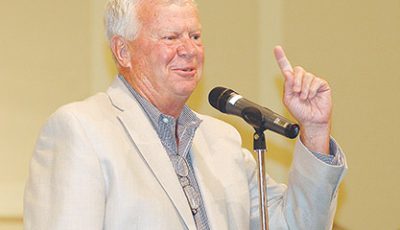Take a stand against trash
Driving around, I see trash strewn from one end of town to the other. It’s sad and reminds me of movies of less developed countries or those depicting the future, close to or after an environmental collapse.
Looking at the trash, I can’t help but be reminded of the commercial of Chief Iron Eyes Cody, the “crying Indian” in the Keep America Beautiful public service announcement (PSA) which aired the 1970s. If you’re unfamiliar, Cody was in his Native American Indian outfit, shown walking along a trash covered shoreline, and then standing where trash was thrown from the window of a passing car. The trash lands at his feet, and Cody looks at the camera with a tear running down his cheek. It is a powerful message.
We have to get a handle on our trash situation. It is spiraling out of control. The obsession of buying and/or consumerism has created a global waste crisis. It’s estimated that over 98 percent of the items we purchase are trashed within six months.
The problem isn’t just in Corbin or Williamsburg. America has become one of the largest waste producers in the world, creating more solid waste than any other country. We also are running out of places to put the amount of trash that is being generated daily. In fact, the United States is on pace to run out of landfill space in less than 18 years.
The average American produces 4.9 pounds of trash per day and will produce approximately 102 tons of garbage, (or in other words, 204,000 lbs. of trash), in their lifetime.
However, Sweden has found a better way to deal with their trash. They have built Waste-to-Energy (WTE) plants in which they burn their trash, that isn’t recyclable, to produce electricity and heat. This is an expensive process which produces greenhouse gases, but Sweden has come up with new technology, which cleans and filters the emissions to reduce the negative impact on the environment.
We could learn a lot from Sweden, as they are currently the world’s leader in recycling. In 2014 they were already at a 99 percent recycling rate. In fact, the country is now doing so well at recycling, they’re transporting trash in from other countries.
We could also learn a lot from ancient civilizations, who essentially took better care of their belongings, and repaired and reused as often as possible.
How can we stop being a throw-away society? Start now to reduce, reuse and recycle as much as we possibly can. Following are some ideas on what we can do.
Prevention – Reduce and live simply. Ask yourself these questions before making a purchase. Do I need what I am purchasing? Am I filling voids or buying things out of boredom? Am I purchasing this item simply because it’s something new to spice up my day?
Reuse – Repurpose, even upcycle. Upcycling is a form of recycling where instead of turning waste products into new materials, you actually take the product and give it a new use in life. For instance, those jeans with the hole in the knee that you were going to throw away, upcycle them and make your child or grandchild a backpack.
Repair items when possible. Instead of throwing out your favorite shirt that has a small hole or stain, sew the hole up, or put a decorative patch on it.
Recycle as many items as you can. Paper/cardboard, plastic items, and aluminum/pop cans are all recyclable materials. Williamsburg and Corbin have placed recycling bins in a few locations around town. Sort your items before taking to the recycling bins and follow the signs describing which bin you should place your recyclables.
Donate gently used items. There are many organizations that accept charity items that still have a purpose. Donating is one way to ensure helping someone else. For instance, the Lion’s Club accepts old eyeglass donations. They repurpose the frames for someone who is in need. For more information, call 606-528-8769.
Cedaridge Ministries, a non-profit Christian ministry located in Williamsburg, accepts donations of good used clothing, household appliances, furniture, housewares, books, etc. The organization helps the needy and victims affected by fire. To schedule a donation or for more information, call 606-549-1372.
Williamsburg Friendship Center also accepts donations of good used clothing, household appliances, furniture, housewares, books, etc. For more information, call 606-549-5900.
Make a meal plan. Only buy food that you and your family plan to eat.
Wash food containers to use for leftovers. (Remember Grandma’s butter tubs that held many other things besides butter.) If you do this, you can remove the writing from the plastic tub. Start by soaking a cotton ball in nail polish remover with 100% acetone, then in a circular motion, work it over the print on the container. Keep rubbing until the ink comes completely off. (Doing this will help you determine which tub holds the butter.)
Consider collaborating/borrowing products that you only need to use once or twice.
There are other ways to reduce your individual trash production. If we don’t start thinking now about reducing the trash we generate, the problem will just continue to get worse.
FACT: Did you know that plastic bags have been banned from grocery stores and other businesses in eight of the United States including California, Delaware, Connecticut, Hawaii, Maine, New York, Oregon and Vermont. A plastic bag can take up to 1,000 years to totally disintegrate. The reason for this is plastic is man-made and does not exist in nature, therefore there are no naturally occurring organisms which can break down the plastic effectively or even at all.








